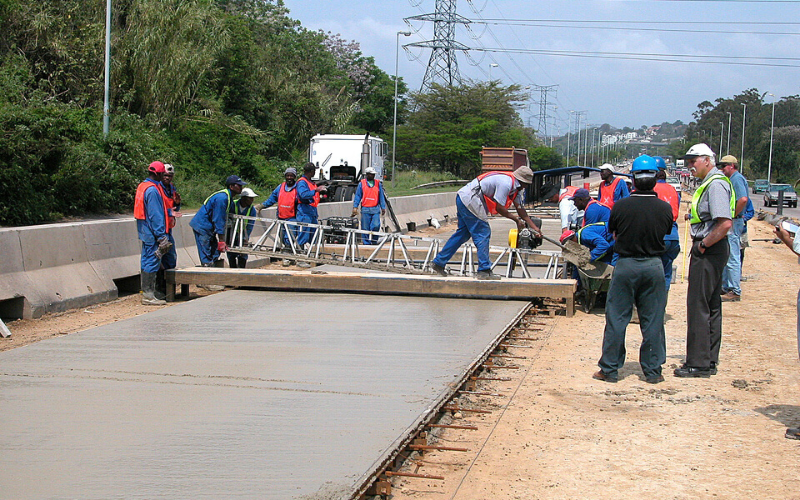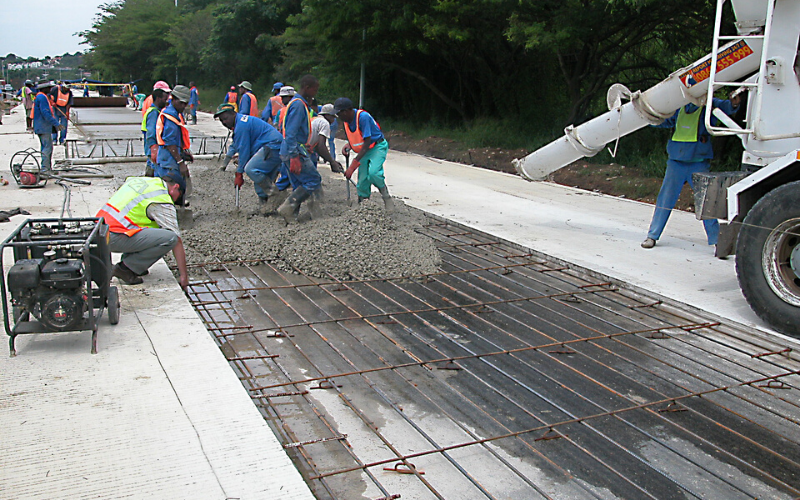
Source depletion has led to rapidly rising costs of aggregates derived from natural sources such as crushed stone, natural sand, crushed gravel, but concrete pavement recycling can provide an alternative aggregate resource that is both economical and sustainable, says Bryan Perrie, managing director of The Concrete Institute (TCI).

Perrie says the recycling of concrete roads is a relatively simple process that involves breaking, removing and crushing hardened concrete from suitable sources to produce recycled concrete aggregate (RCA).
“Concrete pavements are 100% recyclable and such recycling has been extensively used in Europe since the 1940s and in the U.S. since the 1970s. In fact, concrete recycling for paving applications is now carried in more than 40 American states with production of RCA in the U.S.A. averaging well above 100 million tons. The main application of RCA has been as sub-base material, but it also has been used in concrete and asphalt concrete paving layers, high-value rip-rap, general fill and embankment, and other applications.”
Perrie says a major incentive for concrete pavement recycling is cost-savings. Aggregate costs for fill, foundation and surface layers make up one of the highest costs of highway construction: between 20 and 30% according to an American study. Concrete pavement recycling saves some of these costs.
“The cost of producing RCA is confined to the costs of crushing the demolished concrete and screening and backhauling the RCA, coupled with quality control costs. The costs of concrete demolition, removal and hauling apply whether the pavement is recycled or simply discarded. However, RCA production costs may be offset by savings in hauling and disposal costs, especially if the RCA is produced on site. However, in South Africa such recycling may require a waste licence.”
Perrie says cost savings from concrete pavement recycling vary but have been reported to be as high as the dollar equivalent of over R70 million on a single American project. Furthermore, concrete pavement recycling is an environmentally sustainable option that:
- Conserves natural aggregates and other resources.
- Reduces unnecessary consumption of limited landfill space.
- Saves energy.
- Reduces greenhouse gas emissions.
- Captures carbon dioxide (CO2) from the atmosphere.
“RCA particles – which tend to be extremely angular – consist of reclaimed virgin aggregate, reclaimed mortar or both. Reclaimed mortar generally has higher absorption, lower strength and lower abrasion resistance than most virgin aggregates. RCA therefore generally has lower specific gravity and higher absorption than virgin aggregate.”
“The properties of a specific recycled concrete aggregate depend upon many factors, including the properties of the original concrete and the processes used to produce the RCA, particularly the crushing operations. With proper process control, RCA can be produced to meet quality and grading requirements for almost any application and should be considered an engineered material for which the properties must be determined at the outset so that appropriate mix design or construction adjustments can be made.”
“When RCA is used in the production of new concrete mixtures, its effect on the properties of those mixtures can range from minimal to significant, depending upon the nature, composition and gradation of the RCA. For example, when little reclaimed mortar is present in coarse RCA and virgin fine aggregate is used, the handling characteristics and engineering properties of the new concrete properties will be practically the same as if all virgin aggregate had been used. But if the new mixture contains only coarse and fine RCA, these characteristics and properties will be substantially different from traditional concrete mixtures when all other mixture design factors remain constant.”
Perrie adds that recycled concrete aggregate has been used in the construction of hundreds of highway construction projects in the U.S. and around the world in the past 50 years as pavement fill, foundation, sub-base and surface courses for both asphalt and concrete. Successful projects range from relatively low-volume roads to some of the most heavily travelled highways such as the Eden’s Expressway in Chicago.
- The Concrete Institute’s School of Concrete Technology will present a one-day course in CONCRETE ROAD DESIGN AND CONSTRUCTION this year. The training will be provided on June 3 in Cape Town, August 19 in Durban, and October 7 in Midrand. Contact [email protected] or phone 011 315 0300 for full details.

